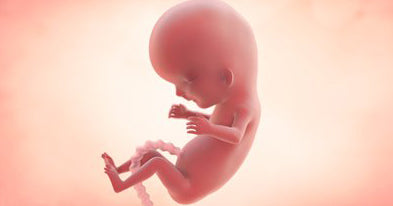
Help along the development of your baby at 11 weeks during your pregnancy journey.
Learn how you can encourage the development of neural connections in your unborn child's brain during this baby development stage.
What's happening this week?
The major formation stage for the baby is almost complete and your baby is officially considered a foetus at this point. This week, his or her genitalia begin forming, and the liver is now creating red blood cells in order to deliver oxygen through the body1-3.
Your baby’s brain cells are multiplying rapidly and his or her neurons and synapses are developing fast. These early neural connections allow your baby to make his or her first movements, which may not be felt by you, but can be detected by ultrasound2.
Your baby at 11 weeks now weighs about 8 grams and is almost two inches (5 centimeters) long3.
What can you expect?
Although you might be exhausted some of the time with nausea and discomfort around your pregnancy belly, some light activity, like walking, could make you feel better. Your muscles and ligaments will stretch as you start to expand a little bit, which could cause pain in your stomach region. Reach out to your doctor, if you are very uncomfortable during this time.
Up to 50% more blood is being pumped through your body and is feeding your baby at 11 weeks. This can make you feel hot, sweaty, and lightheaded. This is your baby’s way of telling you to rest.
New likes and dislikes for food and drink besides a heightened sense of smell are some of the other changes you’ll notice while being 11 weeks pregnant. Another development you’ll see is the appearance of the "mask of pregnancy," which are brown patches or darkened skin called melasma, on your face and body. These usually fade away after the delivery, so don't worry about them. While thick and shiny hair is a boon when one is pregnant, there are ways to tackle greasy, spotty skin caused by hormonal changes in your body.10
Try these simple tips to keep breakouts at bay:
- Wash your face twice daily with a mild cleanser and lukewarm wateri4.
- Avoid squeezing those bumps.
- Monitor what you eat. Certain foods may trigger or worsen acne for some people5.
- Wear a gel based sunscreen and moisturiser as prescribed by the doctor
- Go easy on exfoliation, acne medication and make up
- Hydrate, hydrate, hydrate
What can you do to support your pregnancy?
Keeping a close eye on your diet is important as the blood vessels in the placenta are expanding in size and number at this stage of your pregnancy4.
As the placenta passes nutrients that you consume to your baby at 11 weeks7, you must continue to have a healthy diet filled with key nutrients such as DHA, choline, folate, and iron8-9.
By doing this, you are supporting your baby’s brain development and the growth of neurological connections.
By reading or singing to your baby at 11 weeks and encouraging your partner or a member of your immediate family to do the same, you will strengthen your emotional connection with your child even before his or her arrival.
By Karen Miles | Medically reviewed by Layan Alrahmani, M.D., ob-gyn | October 24, 2021. https://www.babycenter.com/pregnancy/your-body/acne-during-pregnancy_14…
https://www.healthline.com/health/pregnancy/sunscreen-pregnancy




